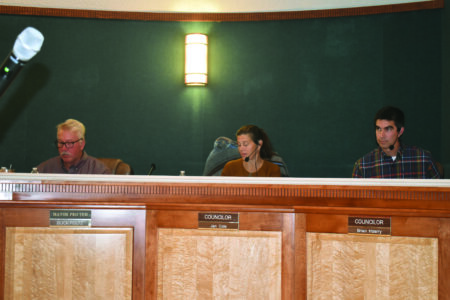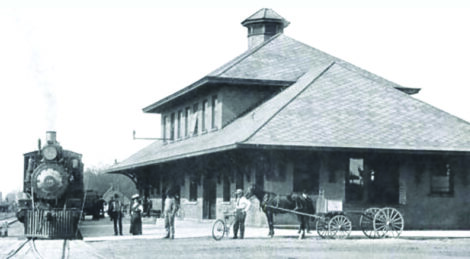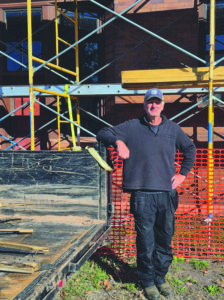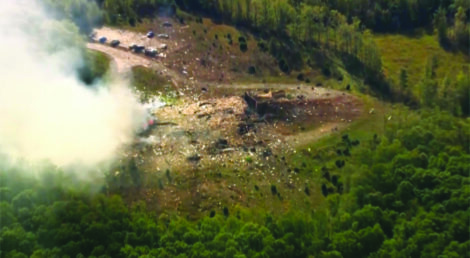Hey Joe!
Celebrating a century of Copper Country life

Graham Jaehnig/Daily Mining Gazette Joe Enrietti takes a brief rest during his 100th Birthday Party on Monday to reflect on the days before cars or radio, his World War II experiences as a tail gunner on a B-24 Liberator in Europe, and life in a once word renowned copper mining region. Keweenaw County resident recalls a century of Copper Country life
CALUMET – Joe Enrietti was joined on Monday by about 150 friends and family in celebrating his 100th birthday at the Siskiwit Reception Hall and Conference Center in Calumet. In his century of living, Enrietti has seen or experienced what most of us just read about or see in T.V. documentaries.
Enrietti was born in Mohawk, on June 9, 1925, in the home built by his grandfather, Vincent Enrietti, on Union Street. He was 15 years old when the United States entered World War II, and after graduating from Calumet High School in 1944, he enlisted in the U.S. Army Air Corps. Assigned to the 8th Air Force, Enrietti became part of the 789th Squadron, 467th Bomb Group, stationed at Rackheath air base, about five miles northeast of Norwich, England. Staff Sergeant Enrietti served as a tail gunner in a B-24 Liberator and received an Aerial Gunner Badge, WWII Victory Medal and European Campaign Metal with a Bronze Star.
Growing up, Enrietti said although his family lived in Mohawk, his father worked for the Ahmeek Mining Company, because the Ahmeek paid more. His father had purchased the Mohawk home from his father. “My grandfather had built that house,” he said.
Enrietti related that when he was a young boy, there were few, if any motor vehicles. “It was horse and buggy days,” he said.
Pointing out his window to a location nearby, he said: “See the legion hall there? The building next door was where you’d rent horses and buggies in the summertime; in the wintertime it was sleighs,” adding that in the winter, the vehicle’s wheels were removed and replaced with skis.
“The roads were never plowed, they were rolled,” he said, “so the horses could walk on them without sinking.”
Enrietti said his family was lucky to have a telephone with a single-party line when party lines were common. “It was cheaper if you got four parties on your line,” he said. “That’s what we started with – if you were lucky.”
Previous to that, the streetcar station had the first telephone in Mohawk. The station master would allow residents to use it if it was an important call.
“They didn’t have to tell you to use it carefully,” said Enrietti, “because if you didn’t, you wouldn’t get to use it a second time.”
Enrietti said during the Great Depression, his family, like others, did not have much. “But my mother was a good Italian cook,” he said. “She made a lot of good things. She made a good meal. We were always fed great.”
Enrietti mentioned the mines being shut down and thousands of unemployed men worked on projects funded by the Work Projects Administration (WPA).
“The school fence down here (Mohawk) was made during WPA time by company masons and helpers,” he said.
Enrietti witnessed the advent of the Technological Revolution, from telephones through digital televisions.
“Radio was just coming in and we had a string of bare copper wire running from a house to a pole or whatever,” he said. “It gave you better reception. Now, at that time, you had four clear channels broadcasting.” Enrietti said the first radios did not have a speaker, but a large horn. His neighbors were the first family to get one.
In the 1950s, television was introduced, he said, requiring a metal antenna mounted high on a pole or a rooftop. “When I found out I could make money working for C&H putting those up, I’d go high as 60 feet.”
His wife saw him installing an antenna on his neighbor’s house; when she saw the height he worked at, Enrietti said she made him quit the job. “She was smarter than me,” he chuckled.
When WLUC began broadcasting, TV viewers then had the option of two TV stations, WLUC and CKPR, which was Channel Two, from Thunder Bay. Enrietti said his first TV was an RCA with a 12-inch screen.
“The world got closer with T.V.,” Enrietti said, “because you could see it just hours after something happened, a lot of times.”
Enrietti left the Copper Country – for the first time – when he graduated from high school and joined the Military during World War II. Returning home after his discharge, he got married and he and his wife left the area shortly after, but not for long.
“When I came home from the war, my wife and I got married, because we were with another couple here who went to Lansing,” he explained. “They talked us into going to Lansing, so we got married and went to Lansing for about 27 months,” said Enrietti. “Pretty soon, we didn’t like the city life, so we came back.”
Not long after returning to home, Enrietti went to work for the Calumet & Hecla in the newly organized Security Department, which was started by a Michigan State Police sergeant. The security uniforms were the same as the State Police troopers of the time, adding he still has his uniform to this day.
Enrietti worked in security for 20 years, until C&H shut down in 1968. He then became an employee of Gately’s Department Store, in Calumet, until the building burned in the winter of 1972. He then worked with Calumet Furniture, eventually buying the business, which he operated until he retired in 1995, at the age of 70. Not one to sit around, Enrietti was asked to go to work with the Erickson-Crowley Peterson Funeral Home as a hearse driver and assisting with funerals.
In his 100 years, Joe Enrietti has experienced much joy, tragic loss. He has survived the Great Depression, a world war, and the end of copper mining in a once wealthy copper region. That he spent his 100th birthday in the company of more than 150 family and friends is testament to his character, integrity and quality.





